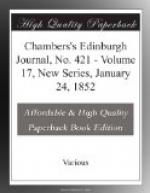WOMEN.
Christianity freed woman, because it opened to her the long-closed world of spiritual knowledge. Sublime and speculative theories, hitherto confined to the few, became, when once they were quickened by faith, things for which thousands were eager to die. Simple women meditated in their homes on questions which had long troubled philosophers in the groves of academies. They knew this well; and felt that from her who had sat at the feet of the Master, listening to the divine teaching, down to the poorest slave who heard the tidings of spiritual liberty, they had all become daughters of a great and immortal faith. Of that faith women were the earliest adherents, disciples, and martyrs. Women followed Jesus, entertained the wandering apostles, worshipped in the catacombs, or died in the arena. The Acts of the Apostles bear record to the charity of Dorcas and the hospitality of Lydia; and tradition has preserved the memory of Praxedes and Pudentiana, daughters of a Roman senator, in whose house the earliest Christian meetings were held in Rome.—Women of Christianity, by Julia Kavanagh.
‘WHARE’ER THERE’S A WILL THERE IS ALWAYS A WAY.’
Langsyne, when I first gaed
to schule, I was glaiket,
In books and in learning nae
pleasure had I;
And when for my fauts wi’
the taws I was paiket,
‘I canna do better,’
was aye my reply.
‘Deed Rab,’ quo
my mither, ‘for daffn’ and playin’
There ’s nocht ye can
manage by nicht or by day;
But this let me tell ye, and
mind what I’m sayin’—
Whare’er there’s
a will there is always a way.




